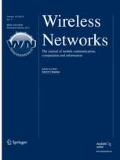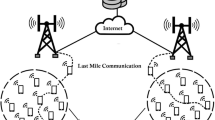Abstract
Wireless link losses result in poor TCP throughput since losses are perceived as congestion by TCP, resulting in source throttling. In order to mitigate this effect, 3G wireless link designers have augmented their system with extensive local retransmission mechanisms. In addition, in order to increase throughput, intelligent channel state based scheduling have also been introduced. While these mechanisms have reduced the impact of losses on TCP throughput and improved the channel utilization, these gains have come at the expense of increased delay and rate variability. In this paper, we comprehensively evaluate the impact of variable rate and variable delay on long-lived TCP performance. We propose a model to explain and predict TCP’s throughput over a link with variable rate and/or delay. We also propose a network-based solution called Ack Regulator that mitigates the effect of variable rate and/or delay without significantly increasing the round trip time, while improving TCP performance by up to 100%.
Similar content being viewed by others
References
E. Altman, K. Avrachenkov and C. Barakat, A stochastic model of TCP/IP with stationary random loss, in: Proceedings of SIGCOMM 2000 (2000) pp. 231–242.
F. Baccelli and D. Hong, TCP is max-plus linear, in: Proceedings of SIGCOMM 2000 (2000) pp. 219–230.
A. Bakre and B.R. Badrinath, Handoff and system support for indirect TCP/IP, in: Proceedings of 2nd Usenix Symposium on Mobile and Location-Independent Computing (April 1995) pp. 11–24.
H. Balakrishnan et al., Improving TCP/IP performance over wireless networks, in: Proceedings of ACM Mobicom (November 1995) pp. 2–11.
H. Balakrishnan, V.N. Padmanabhan and R.H. Katz, The effects of asymmetry on TCP performance, in: Proceedings ACM/IEEE Mobicom (September 1997) pp. 77–89.
P. Bender et al., A bandwidth efficient high speed wireless data service for nomadic users, IEEE Communications Magazine (July 2000) pp. 70–77.
P. Bhagwat et al., Enhancing throughput over wireless LANs using channel state dependent packet scheduling, in: Proceedings IEEE INFOCOM’96 (1996) pp. 1133–1140.
K. Brown and S. Singh, M-TCP: TCP for mobile cellular networks, ACM Computer Communications Review 27(5) (1997) 19–43.
A. Canton and T. Chahed, End-to-end reliability in UMTS: TCP over ARQ, in: Proceedings of Globecomm (2001) pp. 3473–3477.
R. Chakravorty et al., Flow aggregation for enhanced TCP over wide-area wireless, in: Proceedings of INFOCOM (2003) pp. 1754–1764.
M. Chan and R. Ramjee, TCP/IP performance over 3G wireless links with rate and delay variation, in: Proceedings of ACM Mobicom (2002) pp. 71–82.
K. Fall and S. Floyd, Simulation-based comparisons of Tahoe, Reno and SACK TCP, ACM Computer Communication Review 26(3) (1996) 5–21.
P.M. Garrosa, Interactions between TCP and channel type switching in WCDMA, Master of Science Thesis, Chalmers University, Polytechnical University of Madrid (January 2002).
G. Holland and N.H. Vaidya, Analysis of TCP performance over mobile ad hoc networks, in: Proceedings of ACM Mobicom’99 (1999) pp. 219–230.
H. Inamura et al., TCP over 2.5G and 3G wireless networks, draft-ietf-pilc-2.5g3g-07 (August 2002).
R. Jain, The Art of Computer Systems Performance Analysis (Wiley, 1991).
W.C. Jakes (ed.), Microwave Mobile Communications (Wiley, 1974).
F. Khafizov and M. Yavuz, TCP over CDMA2000 networks, Internet Draft, draft-khafizov-pilc-cdma2000-00.txt
T.V. Lakshman and U. Madhow, The performance of networks with high bandwidth-delay products and random loss, IEEE/ACM Transactions on Networking (June 1997) pp. 336–350.
R. Ludwig et al., Multi-layer tracing of TCP over a reliable wireless link, in: Proceedings of ACM Sigmetrics (1999) pp. 144–154.
R. Ludwig and R.H. Katz, The Eifel algorithm: Making TCP robust against spurious retransmissions, ACM Computer Communications Review 30(1) (2000) 30–36.
V. Misra, W. Gong and D. Towsley, Stochastic differential equation modeling and analysis of TCP windowsize behavior, in: Proceedings of Performance’99 (1999).
Modeling TCP throughput: a simple model and its empirical validation, in: Proceedings of SIGCOMM 1998 (1998) pp. 303–314.
P. Narvaez and K.-Y. Siu, New techniques for regulating TCP flow over heterogeneous networks, in: Proceedings of LCN’98 (1998) pp. 42–51.
J. Padhye and S. Floyd, On inferring TCP behavior, in: Proceedings of SIGCOMM 2001 (2001) pp. 287–298.
S. Paul et al., An asymmetric link-layer protocol for digital cellular communications, in: Proceedings of INFOCOM 1995 (1995) pp. 1053–1062.
QUALCOMM, Delays in the HDR System (June 2000).
Third Generation Partnership Project, RLC Protocol Specification (3G TS 25.322:) (1999).
TIA/EIA/cdma2000, Mobile Station – Base Station Compatibility Standard for Dual-Mode Wideband Spread Spectrum Cellular Systems, Washington, Telecommunication Industry Association (1999).
TIA/EIA/IS-707-A-2.10, Data Service Options for Spread Spectrum Systems: Radio Link Protocol Type 3 (January 2000).
S. Karandikar et al., TCP rate control, ACM Computer Communication Review (January 2000) pp. 44–58.
3G Partnership Project, Release 99.
Author information
Authors and Affiliations
Corresponding author
Rights and permissions
About this article
Cite this article
Chan, M.C., Ramjee, R. TCP/IP Performance over 3G Wireless Links with Rate and Delay Variation. Wireless Netw 11, 81–97 (2005). https://doi.org/10.1007/s11276-004-4748-7
Issue Date:
DOI: https://doi.org/10.1007/s11276-004-4748-7




